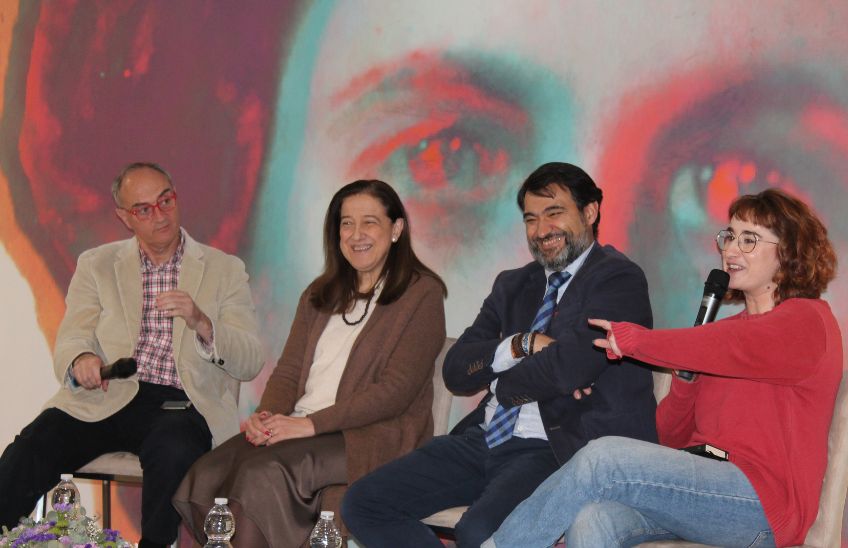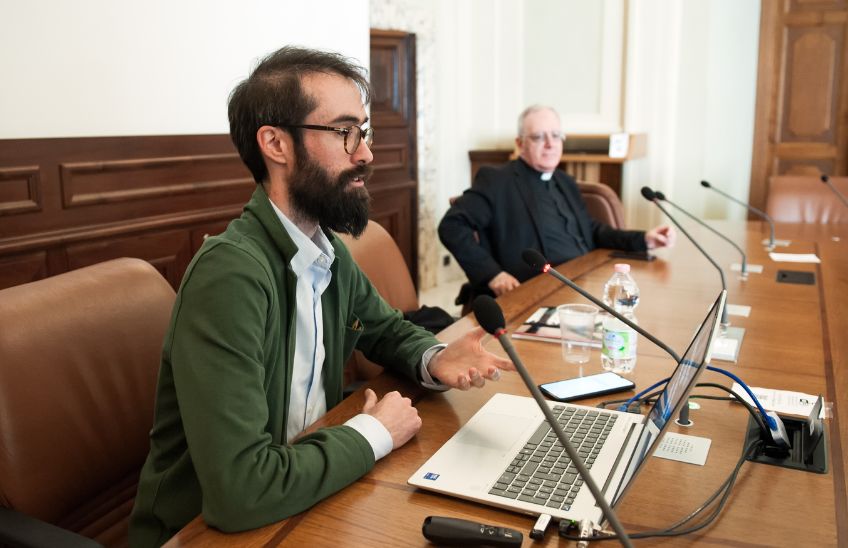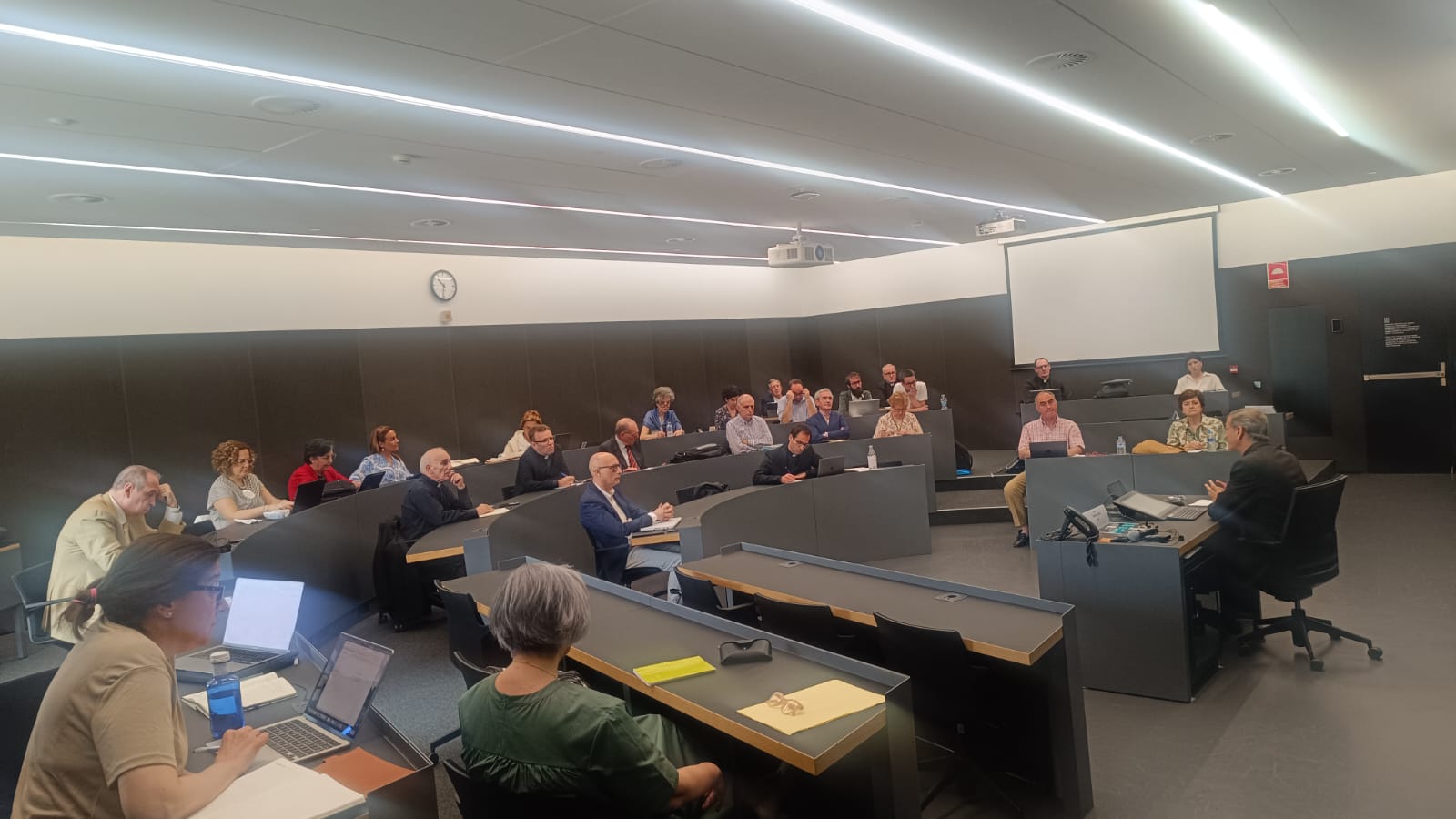A broad apostolic horizon
Chronicle of the journey through America (Part 3). During their extended stay in Mexico, the travelers were impressed by the human warmth they encountered and the promising evangelizing opportunities in those lands.
01 | 08 | 2023
Support, friends and family in Mexico
Before their trip, Casciaro, De la Concha and Vila drew up a list of people to visit in the Americas. Each sought ways to find possible contacts. José Vila asked the young Mexican historian Guillermo Porras to put him on contact with acquaintances. Porras had met the Work in 1947 during a research stay at the file de Indias (Seville) and had then requested his Admissions Office. He provided him with a list of academics and relatives in Mexico City and Monterrey, and the name of a banker working in New York, married to a first cousin.
Ignacio de la Concha obtained two letters of recommendation from the Archbishop of Valencia, Salesian Marcelino Olaechea, for an Argentinean bishop and the Salesian communities in America. In addition, there was his extended family in Mexico, the Martínez Pando family. His uncle Facundo Martinez had arrived there several years earlier in search of a new direction. He was able to settle down, started a family and achieved a good economic status .
During the almost three months they were in Mexico, the Martínez Pando family provided them with a great financial aid. From the very first day they put them up in their house, located at 1360 Avenida de la Reforma issue , a residential area of Mexico City. They also provided them with a car to move around the city. The travelers' diary mentions the following:
May 19th. We arrived at 8:30 a.m. at the aerodrome in Mexico. Three of Ignacio's cousins, his aunt Tere [María Teresa Muro Durand] and his cousin Alicia are waiting for us. Pedro celebrates in the church of Santa Teresita. We feel at home (...) In the afternoon we go, in the Packard [car] that Aunt Tere has put at our disposal, to visit the Basilica of Our Lady of Guadalupe. We get too excited. The archbishop is pontifically blessing a pilgrimage (...). Almost everyone is crying and praying unceasingly to Our Lady. The archbishop advises them not to do too much and to take care of themselves "for the love of God".
Another Mexican, Agustín Basave, who was studying in Madrid and knew the Work through his friend Andrés Vázquez de Prada, wrote to his father, who was director of the Monterrey newspaper El Norte, to introduce him to Ignacio de la Concha. In the letter, he described him as a "man whose culture, solid religious training and sympathy staff, make him appreciable in Degree supreme". Despite their desire to meet Basave in person, they were unable to travel to that city.
Undoubtedly, these first contacts were of great help to them financial aid to establish friendships or a fleeting contact with various people in Mexico City, Cuernavaca, Merida, Puebla, Morelia, Guadalajara, Zamora. The Travelogue records a total of 192 interviews in Mexico with 90 people. These included prelates, clergy, academics, diplomats, politicians, businessmen, students, among others. Many showed interest in Opus Dei and its message, some offered some subject of economic financial aid or made promises of possible jobs for members of the Work who come to Mexico in the future.
"We are very happy in Mexico.
As the days passed, the travelers realized that the twenty days they had planned to travel through Mexico would be insufficient. The people they met, the good dispositions and the numerous opportunities in those lands led them to change their plans.
Pedro Casciaro soon warned the founder about this promising reality and how his calculations for staying there were fading:
"The problem is that here in Mexico there is enough time for the time we want and we do not know how to distribute it, especially because we do not know how long it is convenient to be out of Spain. At first we are thinking of leaving for Chile on July 8, but maybe a month is not enough to visit Monterrey, Merida, Morelia, Puebla, Guadalajara, and they insist that we do not stop visiting other cities. When do you want us to be in Spain?".
From Spain, St. Josemaría Escrivá replied with encouragement and reassurance:
Dearest: I am very pleased with your letters. Stay as long as you think fit, as long as you have possibilities. I am not surprised that you sense that ease and even a possible financial aid later (...)
Do you take care of yourselves? Do not neglect to get the necessary sleep, [and] eat well! With that you give pleasure to the Lord, because you give it to me.
Although neither in the Diary nor in the letters do the travelers go into detail about these two recommendations made by the founder regarding rest and food, the impression is that they had no time to spare. Their days were organized and destined to interviews and negotiations, in addition to the academic activities that José Vila and Ignacio de la Concha carried out. Some notes also show that they were not averse to chili and other local additives, which "are good stimulants for eating and for some taco to escape", avoiding culinary competitions with the Mexicans if chili was involved.
Farewells and prospects
Finally, on August 10, it was time for him to say goodbye to Mexico. In his diary they noted:
"Today we got up earlier; Peter celebrated [Mass] at seven o'clock and average. We had to be at the airfield at 9 and ¼ o'clock. We left for there a little after 8 ½ o'clock. (...) We arrived well in advance to arrange customs.
Soon some friends arrived to see us off: Bernardo Caso, Pepe Santibáñez, aunt Tere, her daughters and Octavio [Armengol]; Alejandro Quijano and Augusto Ibáñez and some of Ignacio's relatives.
(...) We left with some delay due to flooding caused by rain in the countryside. Instead of landing here, the plane we were to take landed in Veracruz, and we had to go there ourselves.
There we also took quite a long time to leave; we definitely got up from Mexico around one o'clock".
During their 84-day stay in Mexico, they recorded many details that reflected their enthusiasm for the experience they were living and the broad apostolic horizons they saw in those lands.
From the very beginning, Pedro Casciaro tried, through his letters, to convince the founder of Opus Dei and some of his close collaborators such as José Luis Múzquiz and Antonio Fontán of the urgency of sending a small group to Mexico to establish Opus Dei in that country.
On May 28, a few days after arriving in Mexico, Casciaro wrote to Antonio Fontán, one of the members of committee General of the Work: "We are very happy in Mexico. The list of friendships that we brought with us is getting longer in an alarming way" and a few days later, on June 21, in another letter he commented: "We breathe when we arrive in Mexico: the language, the character, etc. Here it is like being in Spain. Besides, thanks to God, we have found some families who love us".
Casciaro's impressions were shared by his two colleagues. José Vila mentioned in a letter to his friend Juan Bautista Torelló "the people of Mexico, have stupendous conditions. Natural kindness, great heart, and above all, loyalty, capacity for loyalty to themselves, to great things".
Ignacio de la Concha, at the end of July wrote to Vicente Fontavella about the wide panorama they were discovering day by day: "Mexico presents a splendid harvest. We thought we were going to stay about 20 days and today it is two months since our arrival and we will have to cut our losses to continue south".
With these impressions in their minds and hearts, the travelers said goodbye to Mexico and set out for Peru. Their successive notes convey a certain nostalgia for Mexico and, in the case of Casciaro, the insistence to the founder to "send people as soon as possible, before friendships grow cold". However, the expeditionaries did not waste time in melancholy. There were still three countries to go and they wanted to make the most of every moment before returning to Spain.
_______________
Text based on:
Santiago Martínez Sánchez, "Los ojeadores. Un largo viaje por América". Episode of the Fragments of History podcast (2023).
Santiago Martínez Sánchez, "Los ojeadores. A long journey in 1948 to prepare the arrival of Opus Dei in America," in Studia et Documenta, Vol. 17, (2023), pp. 67-109.
Santiago Martínez Sánchez and Federico Requena, "The transnational expansion of Opus Dei from Spain to Ibero-America: origins, modalities and contexts (1948 -1956)," in Revista de Historia, No. 30, (2023), pp. 1-35.
Related content:
75 years of Pedro Casciaro's first pilgrimage to Mexico. Chronicle of the journey through America (Part 1).
An apostolic and cultural expedition. Chronicle of the trip through America (Part 2).



